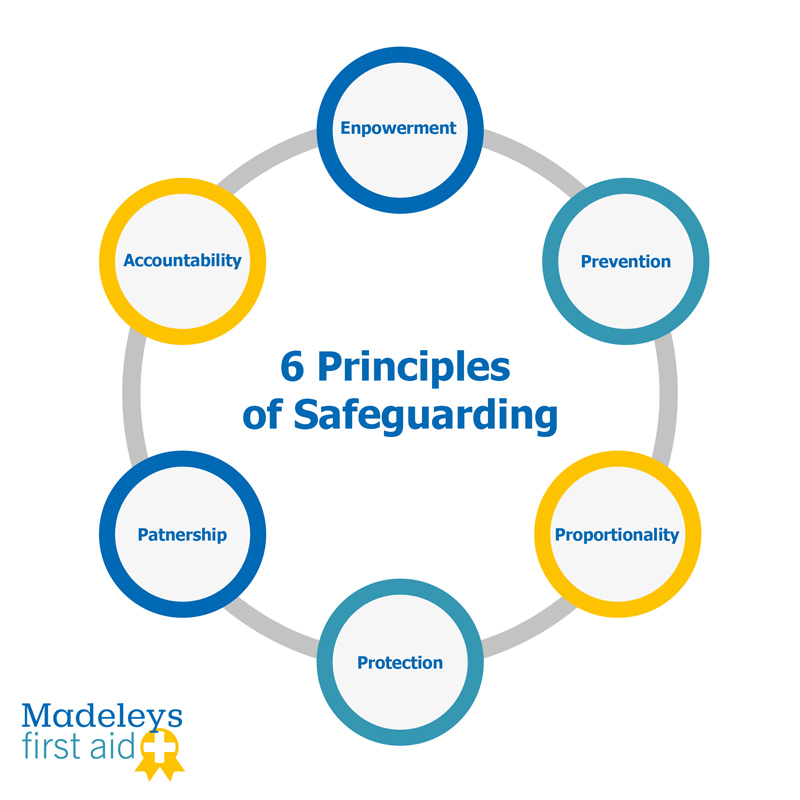What are the Six Key Principles of Adult Safeguarding?

Why Were the 6 Principles of Safeguarding Created?
The Care Act 2014 is a significant piece of government legislation focused on the protection and safeguarding of adults. This comprehensive document addresses the needs of both caregivers and individuals receiving care, and upon its implementation in 2015, it superseded much of the previous legal framework.
As part of this, the government created six key principles of safeguarding, which are the important elements of any good safeguarding policy in any organisation, business or even community. While the Care Act, and the principles, are primarily focused towards safeguarding adults, many of the themes are also appropriate when it comes to protecting children from various types of abuse , neglect and harm as well.
1. Empowerment
Individuals are actively supported and encouraged to make their own informed choices, ensuring that obtaining informed consent is always prioritised in the decision-making process.
2. Prevention
Implementing proactive measures is critical to prevent potential harm from occurring before it happens, thereby safeguarding individuals effectively.
3. Proportionality
Responses to safeguarding issues should always be the least intrusive necessary while still being appropriate and effective for the level of risk involved.
4. Protection
It is crucial to provide comprehensive support and representation for individuals who are most vulnerable and at risk, ensuring their well-being and safety.
5. Partnership
Collaboration among local services, organisations, and communities is essential in fostering comprehensive solutions; communities play a vital role in the prevention, identification, and reporting of neglect and abuse cases.
6. Accountability
All safeguarding practices must be carried out with a commitment to transparency, while also maintaining a rigorous sense of accountability for all actions taken.

Applying the 6 Principles of Safeguarding
Understanding the 6 principles of safeguarding is essential, but recognising how to put them into action is equally imperative. Here are several key areas where these vital principles are actively at work, making a significant difference in the lives of individuals.
- Balancing Confidentiality with Safeguarding
- Appointing a Safeguarding Officer
- Which legislation supports the principles of safeguarding?
- Why are the 6 principles of safeguarding important?
This principle is crucial as it emphasises the importance of taking proactive measures to significantly lower the risk of abuse and neglect. By prioritising prevention, we can create a safer environment for everyone and ensure that individuals are not just protected, but empowered to thrive.
Recognising the signs of abuse, harm, and neglect is absolutely essential. Being vigilant can make all the difference in safeguarding the well-being of vulnerable individuals and ensuring they receive the help they desperately need.
Why is Safeguarding Essential
Safeguarding is an essential component you will encounter in numerous industries, especially in education, healthcare, and social care. The diverse range of safeguarding practices and processes is designed to identify and protect individuals who may be vulnerable to abuse or neglect, all rooted in key principles of safeguarding. If you are in a position with safeguarding responsibilities, mastering these fundamental principles is crucial for effectively fulfilling your obligations and making a genuine difference in the lives of those you serve. Embrace this knowledge; it empowers you to create a safer environment for everyone.
Adult safeguarding involves protecting vulnerable adults from harm, abuse, neglect, or mistreatment. To promote the safety of these individuals, the UK government established a set of adult safeguarding principles. While initially designed for professionals in adult care and health services, these principles now extend to any sector that regularly interacts with vulnerable adults, including voluntary organisations. Adult safeguarding encompasses the policies and actions implemented to safeguard vulnerable adults from harm, abuse, and exploitation. These principles and policies aim to minimise the risk of mistreatment by increasing awareness of the issue, providing a solid framework for supporting vulnerable individuals, and empowering workers and volunteers to effectively tackle any concerns that may arise.
Summary
The 6 principles of safeguarding are important for the same reason that safeguarding is important: every person has the right to live free from abuse and neglect. Safeguarding, and the 6 key principles of safeguarding, provide ways that this can be achieved. To recap, this is by:
- Empowering vulnerable adults to make their own decisions
- Preventing harm from occurring as soon as possible
- Responding to risks in an appropriate, ideally unintrusive manner
- Ensuring everyone has the knowledge and training required to protect people from abuse
- Partnering with other organisations and communities to support vulnerable people
These principles are critical to prevent abuse and neglect from occurring, while also ensuring the best possible level of care is given. By following the key safeguarding principles, we can be sure that we are doing the best we can to protect vulnerable people from harm.
Industries We Work With
At Madelys First Aid +, we work with a wide range of industries offering different courses. Here are our main industries we work with for first aid training and mental health aid courses
Trust 30 years of NHS experience.
Choose Madeley's First Aid Plus for expert medical knowledge, practical insights, and top-notch professionalism. Discover our adaptable training programs tailored to your needs.

%20(1).jpg)